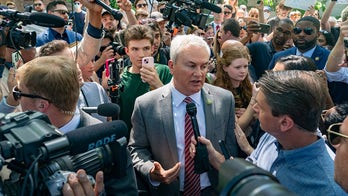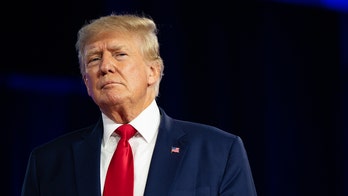President Obama is looking to the past to help reduce growing federal budget deficits threatening the country's future.
In his weekly radio and Internet address Saturday, Obama called on Congress to pass a pay-as-you-go legislation, known as PAYGO, that would require new federal spending to be offset by budgetary cuts or tax hikes.
"We need to adhere to the basic principle that new tax or entitlement policies should be paid for," he said, asserting that PAYGO "helped transform large deficits into surpluses in the 1990s. Now we must restore that sense of fiscal discipline."
Fiscally conservative Democratic lawmakers, known as Blue Dogs, told Obama on Friday that they're working on a PAYGO plan and that they prefer to offset new spending with spending cuts elsewhere. Rep. Baron Hill of Indiana will introduce legislation next week, a Democratic aide told FOXNews.com
The federal deficit is projected to hit a record high of more than $1.8 trillion this year, due in large part to the government providing aid to Wall Street firms and other struggling companies, as well as Obama's $787 stimulus package. Pay-as-you-go legislation wouldn't affect that spending.
The Congressional Budget Office has forecast the deficit would drop to nearly $1.4 trillion next fiscal year, and Obama is aiming to cut it in half by the end of his first term. But the federal deficits are facing explosive growth from entitlement spending on Social Security, Medicare and Medicaid.
"We can't continue to spend money like we spend and borrow money from China to do it," Kristen Hawn, a spokeswoman for the Blue Dog Democrats, told FOXNews.com. Asked how the pay-as-you-go rule might affect Obama's ambitious agenda to reform healthcare, energy and education, she said, "I think all those things need to be done but in a fiscally responsible manner. And the president knows it too."
But economists, while acknowledging that PAYGO helped create surpluses under President Clinton, aren't sure it will work now while the country battles a severe recession.
"The success of PAYGO depends on how it's set up," said Alan Viard, an economist with the American Enterprise Institute.
He noted that the PAYGO was more effective as law in 1990s than as a rule in recent years. But Viard said PAYGO isn't entirely responsible for President Clinton leaving his successor a budget surplus of $128 billion.
"The surpluses resulted from a number of factors coming together," Viard said, noting that the '90s saw the fall of the Soviet Union, which led to a reduction in defense spending; a slowdown in the rise of health care costs and rapid economic growth.
But Viard added that Clinton and Congress deserve credit, too, for the surplus, explaining that the rule is only effective if lawmakers follow it.
"If you already have some willingness for restraint on the part of the president and Congress, this rule can strengthen it," he said. "But if you have a president and Congress fundamentally opposed to restraint, a rule in place doesn't do much good.
"In the end, it's an aid to political resolve, not a substitute for it."
PAYGO was first established in 1990 as part of a bipartisan effort to reduce large deficits facing the country then. President Clinton and lawmakers began waiving PAYGO more often as prosperity and budget surpluses increased. Lawmakers allowed PAYGO to expire in 2002 after approving President Bush's massive tax cuts without offsets.
The House reinstated PAYGO in 2007 but it has been repeatedly waived for different bills.
Viard said he supports bringing PAYGO back as law.
"PAYGO hopefully would prevent further deterioration in the long run outlook, which is already grim," he said. "We cannot continue to create new entitlements that we don't pay for."




